

OptiProERP
How is it Impacting Business? Innovations have brought about some significant milestones to industries over the years.

In 1765 the first industrial revolution began when the use of coal and steam engines became popular allowing for the transportation of goods using railroads. Mechanization also became widespread and the United States became more focused on manufacturing rather than agriculture. In 1870 the second industrial revolution came about with the introduction of electricity, gas, and oil. Internal combustion engines were developed and widely used and big inventions were the telegraph, the telephone, the automobile, and the airplane. Steel and chemical synthesis were also a big part of this revolution. Factors to Consider Before Selecting Cloud vs. On-Premise ERP.
Companies are not only acknowledging the advantages of effective ERP systems, they’re also increasingly adopting these solutions such that the market will be worth $60.23 billion by 2026.

Advanced technology, AI, data analytics, IoT, and global competition have collectively engineered the need for more transparent business processes. They have also necessitated increasingly comprehensive data collection, leading companies to acquire new ERP software with the capacity to handle these features or upgrade their systems accordingly. Yet, many companies have a cloud vs. on-premise deployment problem — they are not sure which one best suits them. Cloud vs. Legacy ERP: Why Cloud ERP is Better. Is your current ERP system up-to-date with the needs of your business today and into the future?

If you’ve been using a legacy ERP system for decades, it’s likely your business is compromised. Your current business management software should be more powerful and capable than the system you used a decade ago. Let’s take a look at why a modern, cloud-based ERP is better for your business than legacy ERP software. What Is a Legacy ERP System? Digital Transformation with Manufacturing ERP: Why Manufacturers Need to Modernize Now. The manufacturing industry is constantly evolving and modernizing, presenting new challenges for small and midsize manufacturers.

Supply chains have become more global, more complex, and now with the pandemic, more restrictive. Customer demands are pushing for greater convenience, better quality, and lower costs. Employees expect modern systems, mobility, flexibility, and a connected work environment.
5 Key Financial Management Functions ERP Helps You Manage. Understanding ERP Modules and their Business Benefits. Gone are those days when growing companies used to manage their data on spreadsheets.

Modern businesses rely on Enterprise Resource Planning (ERP) software to help them collect and organize financial and operational data in a shared database to promote efficiency, as they scale. From providing accurate, real-time information to automating business operations, ERP helps users navigate complex processes. According to a report by Market Research Engine, “The ERP market remains in a phase of rapid expansion, with total market size expected to exceed $49.5 billion by 2024.”
SMB Manufacturers Guide for Budgeting an ERP Project. Why Manufacturers Need to Upgrade Their Custom ERP Software. ERP Implementation Best Practices in 2021. Once you select an ERP system best suited to your company, it will be time to implement the software.
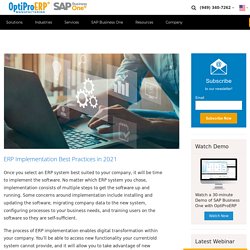
No matter which ERP system you chose, implementation consists of multiple steps to get the software up and running. Some concerns around implementation include installing and updating the software, migrating company data to the new system, configuring processes to your business needs, and training users on the software so they are self-sufficient. The process of ERP implementation enables digital transformation within your company.
The 5 Essential Steps to Help Manufacturers Select the Right ERP System. It’s more important than ever for manufacturers to find ways to effectively manage their operations in the face of Covid-19, supply chain disruptions, inflation concerns, glimpses of recovery, and the many dynamics impacting manufacturers’ bottom lines.
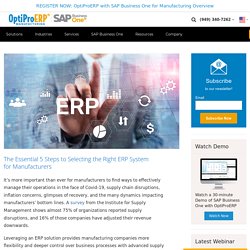
A survey from the Institute for Supply Management shows almost 75% of organizations reported supply disruptions, and 16% of those companies have adjusted their revenue downwards. Leveraging an ERP solution provides manufacturing companies more flexibility and deeper control over business processes with advanced supply chain management capabilities to navigate these challenges and increase efficiency, productivity, and profitability. Key Steps to Successful ERP Implementation. An ERP system integrates all the basic business operations on one platform and delivers benefits such as increased productivity, better collaboration, etc.
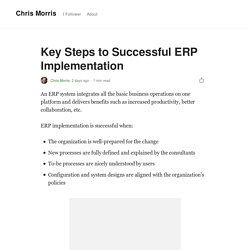
ERP implementation is successful when: The organization is well-prepared for the changeNew processes are fully defined and explained by the consultantsTo-be processes are nicely understood by usersConfiguration and system designs are aligned with the organization’s policies. Why Your Manufacturing Company Needs ERP Software. ERP Software Selection: 6 Things to Consider for Supply Chain Management. Enterprise Resource Planning (ERP) solutions are now a dime a dozen.
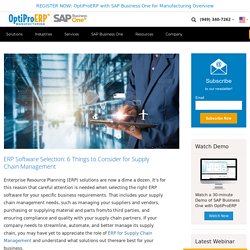
It’s for this reason that careful attention is needed when selecting the right ERP software for your specific business requirements. That includes your supply chain management needs, such as managing your suppliers and vendors, purchasing or supplying material and parts from/to third parties, and ensuring compliance and quality with your supply chain partners. If your company needs to streamline, automate, and better manage its supply chain, you may have yet to appreciate the role of ERP for Supply Chain Management and understand what solutions out thereare best for your business. ERP for Small Manufacturers, Accounting Software vs ERP. Here’s what you need to know 6 min read… If you are a SMB manufacturing unit producing the products you sell, you need more than just an accounting software!
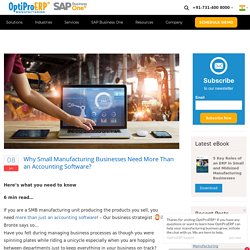
– Our business strategist Emily Bronte says so… Have you felt during managing business processes as though you were spinning plates while riding a unicycle especially when you are hopping between departments just to keep everything in your business on track? Many successful businesses use more than just an accounting software to manage their everyday business processes. What are the Steps in Production Planning and Control? Production planning and control is a predetermined process that plans, manages and controls the allocation of human resource, raw material, and machinery to achieve maximum efficiency.
Production planning is a sequence of steps that empower manufacturers to work smarter and optimize their production process in the best possible manner. This helps manufacturers work smarter by efficiently managing internal resources to meet customer demand. Objectives of Production Planning and Control (PPC) Having a reliable Production Planning and Control software in your company makes it easy to: Ensure cost-efficient production processPromote timely delivery of goodsMinimize production timeImprove customer satisfaction Coordinate with departments about production, to ensure things are on the same pageEnsure the right man is assigned the right work. What are the Benefits of ERP in the Manufacturing Industry.
The manufacturing sector has gone through a massive overhaul. Sought-after manufacturing practices encourage mobility of information, it manages growth and boosts productivity. Fortunately, with best of breed software solutions, it has become possible for employees to work collaboratively, no matter where they are, irrespective of the time. ERP Software for Automotive Manufacturing Industry. Key benefits of cloud-based ERP for manufacturing. Cloud-based Enterprise Resource Planning software is the business driver that ensures better visibility of data, quicker and diligent decisions, and synchronization of all the operations across the organization. Cloud ERP ensures that every authorized user can manage, view, and edit the business reports from anywhere, at any time, using smart devices. We’ve listed a few benefits of cloud based ERP for manufacturing: It’s Time to Find a Way Forward With Industry 4.0 - ERP News.
Advanced Planning and Scheduling Software. NDMA Guidelines to Restart Manufacturing Units Post Lockdown, OptiProERP. There are many regions in the world including Italy, some states of the U.S.A., Spain, etc. that have announced to ease lockdown restrictions and move ahead with the new normality of COVID-19. Presently, the National Disaster Management Authority (NDMA), India has issued certain guidelines for restarting manufacturing industries. Manufacturers have to follow strict guidelines to run the businesses and simultaneously ensure that there are no infected cases registered.
How AI and ML will Enhance ERP and its Impact, OptiProERP. Scenarios in which the entire production cycle is managed with just a few clicks and taps and are not limited to science fiction movies anymore. As per a study by Gartner, 37% of organizations have implemented Artificial Intelligence solutions in one form or another. Digital disruption has led companies to change their workflows. Artificial Intelligence (AI) and Machine Learning (ML) have a lot of share when it comes to revolutionizing the way software operates and functions within organizations.
Enterprise Resource Planning (ERP) software available in the market today are quite different from their legacy counterparts used even five years back. Exception Management for Manufacturers with Cloud ERP Software. Grow your manufacturing business beyond QuickBooks. How CFOs Are Leading Manufacturing Digital Transformation. SAP Business One Consultant: Automated Manufacturing, Shipping and Payments. Create the Best Manufacturing Customer Experiences with Cloud ERP. 4 Benefits of Digital for Manufacturing SMEs. Cash Flow Improvement through Process Visibility using Cloud ERP. Achieve Manufacturing Excellence with Cloud ERP. Introduction to Intranet Business Portal. Customer success tesla transformers. SAP Business One with OptiProERP Overview, On-Demand Webinar, OptiProERP. Value Creation & Digital Transformation for Manufacturers via Cloud ERP. Steps for Successful ERP Implementation. Manufacturing ERP for Cloud.
How customizable does my ERP need to be. Master Production Schedule (MPS) Drive Lean Manufacturing With Your ERP System. ERP for manufacturing. 5 Things Manufacturers Should Consider When Selecting a New ERP System. SAP business one for manufacturing. ERP implementation services. Wholesale distribution software. Medical device manufacturing software. Erp software for the metals fabrication Industry. ERP implementation in telecommunication industry. Electrical distribution software. Manufacturing Industry ERP Software.
Manufacturing accounting and financial management ERP. Cloud ERP Manufacturing Software. ERP Solutions for Manufacturers and Distributors. Manufacturing ERP Software. Is 'Best of Breed' really 'Best' for you? How customizable does my ERP need to be? Have you considered the advantages of cloud ERP?